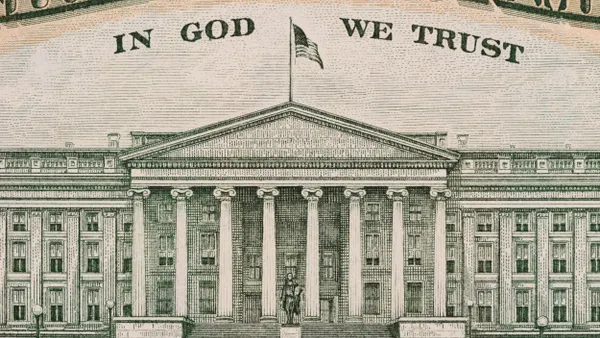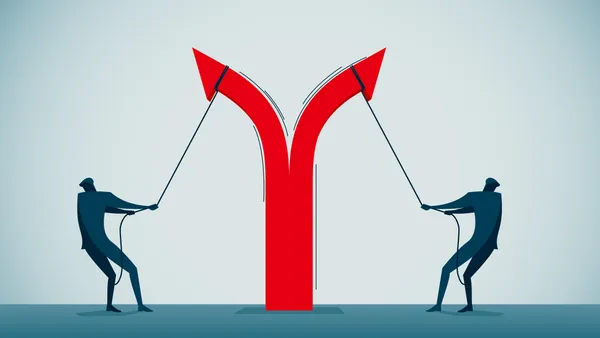‘Tis the season to hear forecasts.
And at last week’s luncheon sponsored by the University of Chicago’s Graduate School of Business, three distinguished economic and financial experts looked into their crystal balls and offered economic predictions for 2001 before a crowded Waldorf Astoria conference room audience.
Speaking with clipped, staccato phrases, the three painted a more gloomy than upbeat picture, although they offered a few reasons to remain optimistic. Here are a number of their predictions for 2001:
Marvin Zonis, Professor of Business Administration at Chicago GSB
- Mexico will experience economic turmoil despite recently joining the world’s democratic nations. “The reason is, every country that has had a monopoly of power, such as the PRI in Mexico, has had economic turmoil, as the new administration [tries to eliminate] the corrupt economic relationship that existed between power and money. Difficulties tend to follow,” Zonis stressed. “Mexico will be no exception.”
- Southeast Asia will experience a “massive decline,” and the once dubbed “Asian Tigers” will be a significant drag on the global economic climate. Rampant political disintegration and corruption in Indonesia, Malaysia, Thailand, Burma, Vietnam and Cambodia will exacerbate economic stagnation in these countries in 2001.
- Unlike many of its neighbors, Japan’s economy will experience moderate growth in 2001, after declining in 1998 and 1999. “Only the internationally oriented manufacturing companies in Japan have truly restructured,” he added. “The rest of the economy is mired in public debt (more than 125 percent of GDP), and the banking, insurance, retail and construction sectors are all on the verge of bankruptcy.” In addition, he warned that declines in consumer spending would further depress the Japanese economy.
- Zonis was optimistic about China. He pointed out that only 22 percent of China’s exports in 2000 were made up of electronic components. All other countries in Asia had a higher share of electronic components as a percentage of overall exports.
For example, electronic components accounted for 60 percent of the exports in the Philippines and 44 percent in Taiwan. As U.S. demand for electronic devices declines in 2001, Zonis stated, China’s exports will not be as severely impacted as many of its Asian neighbors. “The U.S. will continue to buy the goods that China produces and exports, as a result of which China will not receive such a pronounced downward shock,” Zonis said.
Another positive sign is that China is in the midst of a political transition. “Watch in the year 2001 China’s Vice President, Hu, will be appointed Secretary General of the Communist Party, as President Jiang Zemin begins to give up power.” This transition, he believes, will be made in an environment of political stability.
Finally, China’s accession to the WTO in 2001 will spur corporate restructuring, Zonis predicted. Although he conceded that the restructuring process will entail its share of conflict, he asserts that things are “moving in the right direction in China.”
- Zonis was also optimistic about Europe. “The Euro will begin to become a global reserve currency in 2001,” he predicted. The currency will appreciate in value significantly against the dollar, and he noted that by 2001 Euro coins and bank notes will begin to be distributed across the Euro zone for use in commercial transactions at the beginning of 2002, further propping the currency.
- Zonis believes the EU will expand to the east in 2001.
- The Russian economy will have a good year because of an increase in oil prices and natural gas exports. The increase in oil prices is estimated to have added as much as 8 percentage points to Russia’s GDP in 2000, and has allowed Russians to experience a wealth effect and feel more optimistic about the future.
Zonis conceded that there has not been a fundamental restructuring of the Russian economy. “Vladimir Putin does not have the first idea of what a Russian economy is, but has been able to ride a wave of prosperity, which will continue into 2001,” he said. Zonis forecasted that oil prices will remain high until the summer of 2001, when there will be a significant drop.
Robert Z. Aliber, Professor of International Economics and Finance at Chicago GSB
- The U.S. economy is entering what Aliber called “debt repayment mode,” which will cause savings rates to increase and significantly dampen growth. Aliber stressed that sub-prime lenders are in distress, and an increasing number of companies are filing for Chapter 11. He believes the dollar has peaked in the foreign exchange market, and stressed that the Euro had appreciated by approximately 6 percent in the last three weeks.
Aliber’s forecasts for the U.S. economy in 2001–Real growth rate will be 1.8 percent, consumer spending will grow 2.4 percent, and the unemployment rate will average 5.1 percent. “This is my optimistic forecast,” Aliber warned. “What makes this year very different from any previous year in U.S. financial history is that the negative wealth effect will be much larger than ever experienced before.”
Joel M. Stern, Managing partner and CEO of Stern, Stewart & Co.
- There will be no major tax cut and no massive new spending for government initiatives because of the political stalemate in this year’s presidential election and a divided Senate. Since the economy is already experiencing a huge slowdown accompanied by the stock market decline, a large part of the expected budget surplus, at least in the near term, has vanished. “Much of the budget surplus came from an unexpectedly large increase in virtual income, taxes from realized capital gains and taxes on truly unbelievable corporate profits,” Stern stressed.
And uncertainty on the role of government generally causes real growth to slow, simply because economic agents are likely to take a wait and see attitude, thereby curbing plans for both investment and consumption, he added.
- Real GDP growth will be 2.5 percent in 2001, but with weaker growth in the first half, perhaps as low as 1 percent annualized. “I think we could even see a very mild recession in the first half of 2001,” he added.
The reason is that the monetary base has been growing at only about 0.8 percent over the past year, after a greater than 6 percent growth rate in the prior three years. The bad news, Stern claimed, is that expected monetary expansion means that at long last, inflation will be greater than it has been in the last three years with a CPI increase of about 3.3 percent, and stable long-term interest rates.
“I expect the 30-year government bond to average 5.8 percent, within a range of 6.25 percent at the high end and 5.4 percent at the bottom.” With slow growth, he expects the unemployment rate to average 4.4 percent. Corporate profits will only increase by 4 percent and the deficit on the trade balance will be negative $320 billion thanks, in large part, to the price of a barrel of oil, which currently ranges between $30 and $35.
- The market will head upward in the second half of 2001.












